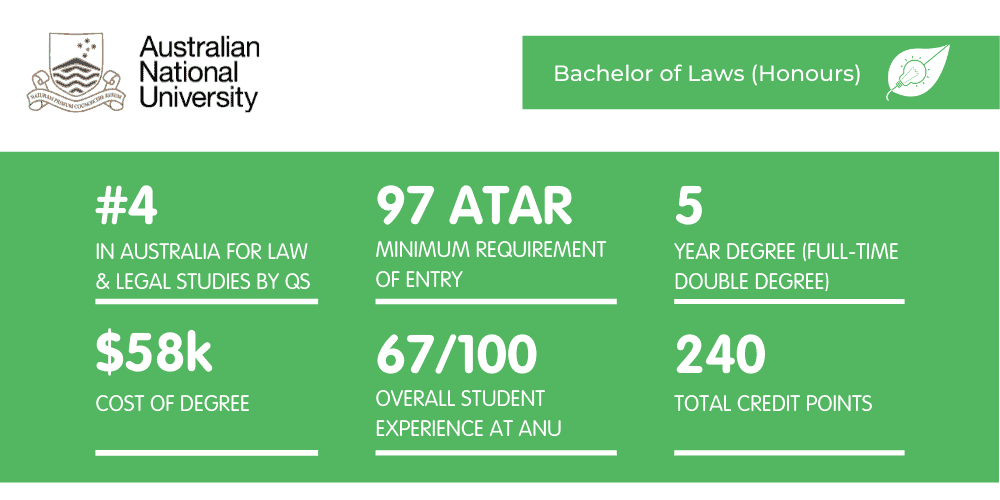
Ever wondered what it’s like studying a Bachelor of Law (Honours) at ANU, right in the heart of Australia’s Capital with the High Court a stone’s throw away?
We’ll be taking you through possible career paths, student experience, entry requirements and core units below.
Let’s get into it!
What is a Bachelor of Laws (Honours) at ANU?
Core Units and Specialisations
How to Get into a Bachelor of Laws (Honours) at ANU
What’s the Teaching Format?
What’s the Faculty and Culture Like?
What is a Bachelor of Laws (Honours) at ANU?
A Bachelor of Laws is an undergraduate degree and the first step to kickstarting a career in the legal field. Like other universities, a Bachelor of Laws (Honours) at ANU must be studied as a double degree with a range of approved undergraduate courses available like Philosophy, Commerce, Information Technology or Political Communication — wherever your interest lies, there is a combination that suits you!
Studying a double degree means that you are able to combine your passions and opens up a variety of career options.
Career Paths
An ANU Law degree equips graduates with a range of skills — research, analysis, argument, collaboration and communication — which are all in demand from employers and are transferable skills for various careers.
A Law degree enables graduates to work in private and public sectors, in law and legal practice roles. However, ANU Law degrees also provide foundations for careers in:
- Law and Legal Practice
- Politics
- Journalism
- Public policy
- Global diplomacy
- Government
- The Arts
- Finance and Business
Check out more careers that law graduates may find themselves in here!
Core Units and Specialisations
What are the Core Units?
Of the 240 units undertaken as part of your double degree, 192 of them are law units. Of the 192, 96 of them are core law units. Some of the core units include:
- Foundations of Australian Law
- Contracts
- Australian Public Law
- Equity and Trusts
- International Law
Foundations of Australian Law
This unit is designed to lay the groundwork for students’ legal studies. It helps students to develop a range of legal skills essential for both legal studies and professional practice.
Through analysis of case law and legislation to form legal arguments, the course covers key legal principles of statutory interpretation and the role of courts in interpreting statutes.
Contracts
This subject is another foundational unit which examines the law of obligations. It covers the key principles of contract law and students apply skills acquired through problem solving in hypothetical fact scenarios where they have to identify legal issues and provide advice to a hypothetical client.
International Law
This unit deals with the legal aspects of the functioning of the international community, including the relation between States and other international organisations. It takes a look at the impact of international law on the Australian legal system and various theoretical perspectives on the formation, and operation, of the international legal system.
A further 48 units are completed as 4000-levels courses which are designed to enable students to expand on their understanding of core units of law or to apply skills gained. These include the Jessup Moot, a Law Internship, Law and Sexualities and Human Rights Law among many others.
What are the Specialisations?
Unlike other universities, ANU offers four different specialisations for their students to “major” in, these are:
- Corporate and Commercial Law
- International and Comparative Law
- Law Reform, Environmental and Social Justice
- Public Law
Students will get to choose 24 units to be completed as part of their Law degree, in an area that interests them.
Corporate and Commercial Law provide students with insight into an increasingly complex global and domestic commercial environment in which individuals and corporations operate. This major focusses on the governance and regulation of business and legal issues which arise in commercial trading and transactions.
International and Comparative Law equips students for modern global and transnational legal practice. International law has become increasingly relevant to domestic policy and legal issues. Students are provided with the skills to understand foreign legal systems through Comparative Law.
Law Reform, Environmental and Social Justice provides students with the skills to explore and interrogate the complex role of law in society, and the party that lawyers play in prompting both change and stability. Graduates are able to evaluate current legal regulation of complex social issues and assess consideration in planning and executing law reform.
Public Law combines comparative and multidisciplinary perspectives in examining the design, implementation and effectiveness of regulation in Australia. This particular specialisation offers diversity, flexibility and knowledge suitable for a wide range of students.
Internship Opportunities
ANU’s location in the Australian Capital Territory means many major courts and political bodies are located nearby — like the High Court of Australia. Furthermore, the Family Court of Australia is located right on ANU’s campus!
As previously noted, students have opportunities to undertake a Law Internship as part of their Law degree if they choose to do so. The College of Law often distributes information to students regarding practical experiences available for them in public and private law, and even with opportunities overseas.
Internship placements are available in a range of Commonwealth and ACT government departments, NGOs or private firms. For example, ANU has a partnership with the Kimberley Aboriginal Justice to offer internships to students, enabling them to work in the Kimberley Community Legal Service — an independent, not-for-profit legal service.
Full list of opportunities available here!
How to Get into a Bachelor of Laws (Honours) at ANU
For guaranteed admission, a 97 ATAR is required to enter into a Bachelor of Laws (Honours) at ANU.
ANU has several adjustment factors available to add to an applicant’s selection ranks. These are offered based on performance and equity principles like high achievement in subjects or recognition of difficult circumstances students face in their studies.
Bonus points are available for students who have studied selected subjects or experienced disadvantage during their HSC. Additional information about ANU’s Adjustment Factors may be found here.
Scholarships
ANU’s College of Law has a range of scholarships and grants available for students. These help to support students who are struggling financially, but there are also grants that recognise academic excellence or aid students in taking up opportunities overseas.
A full list of grants and scholarships can be found here!
What’s the Teaching Format?
ANU’s academic year consists of two semesters, with Law students generally taking two law units and two units from the other degree they are studying.
Class Structure

Law units generally consist of two hour lectures per week and an hour of tutorials. However, once readings, tutorial preparations, case studies and assignments are added in, students are expected to dedicate at least 10 hours per week to each law unit.
Lectures introduce students to legal concepts, theories and case studies and there are typically up to 300 students in attendance. Depending on the unit, readings may be required to be completed either before or after the lectures have been conducted.
Tutorials provide students with an opportunity to apply the legal concepts and theories they’ve learnt in the lecture to problem questions or scenarios. These help students to consolidate information absorbed in lectures and ask questions about course content they are unsure of, especially with only 20 to 30 students in attendance!
However some courses, like Equity and Trusts, consist of three hours of lectures, sometimes split into two 1.5 hour lectures with compulsory tutorial attendance.
While it may seem like a lot of contact hours, these are opportunities for students to consolidate course content and apply them, which are especially essential for Law where course content tends to be heavy.
What are the assessments like?
Depending on what units you are studying, the assessments for ANU Law differ slightly but generally over the course of your five year degree you will experience the following:
- Tutorial participation
- Hypothetical questions
- Case studies
- Theoretical essays
- Exams — strict time conditions with that may involve hypothetical questions, case studies, theoretical essays, or all three
Skills You Refine and Learn

Studying a Bachelor of Law equips graduates with a range of both practical and soft skills that are highly in demand in the workforce. Students will be able to synthesise knowledge from legal sources to identify and solve complex problems, develop critical thinking skills, be able to conduct legal research and have excellent communications skills.
What’s the Faculty and Culture Like?
Faculty
The Law faculty at ANU consists of around 130 staff members, including administrative staff — ensuring that students are well-supported throughout their Law degree.
“Especially in Law, the lecturers and tutors want to be there. There is such a diverse range of lecturers and we are so lucky to have them.” — Khushi Arora, Bachelor of Commerce/Bachelor of Laws (Honours) II at ANU
Being one of the top Law Schools in Australia, ANU has several notable law lecturers as staff members. The Head of ANU Law, Professor Anthony Connolly has been the Editor-in-Chief of Australia’s leading journal on federal law and federalism, the Federal Law Review. He specialises in legal philosophy, Indigenous Right Law and Public Law.
Additionally, Professor Jolyon Ford the Associate Dean (International) was an Associate Fellow of the Royal Institute for International Affairs, London and Research Associate of the Global Economic Governance programme at Oxford University. He specialises in International Law, Torts and Counter-Terrorism Law and teaches Torts, International Commercial Arbitration and Business, Human Rights and Corporate Responsibility.
Culture
As majority of the students studying at ANU usually board there as well, students can expect to form close friendships with their peers and will likely walk into class and have familiar faces there. Additionally, tutors are very supportive and want to be there to help students.

Since students live on campus, there is always help down the hallway where students can go to their peers for help or support. The College of Law is also located right on campus where students can walk in to seek academic advice, access resources regarding mental health or help with planning their degree.
Societies
The ANU Law Students’ Society is the major Law society, running law events to provide students with the opportunity to network and socialise. Events include talks, scholars, readings and the Law Ball.
Additionally, the International Law Society focusses more on International Law, providing opportunities to students to study abroad. It is especially suitable for students interested in policy-making, embassies or human rights.
They work closely with the Law society, but also independently organising smaller and more specialised events regarding International Law specifically. A lot of political students are also involved in this society, whereas the Law Students’ Society is targeted towards students in Law degrees.
Support
The Law Students’ Society is available for support with a student representative from each year for students to reach out to for advice and they organise peer mentoring too. Additionally, tutorials are in small classrooms of 20 to 30 students, enabling students to reach out to their tutors for advice or support on how to tackle their studies.
The College of Law also helps students with major issues or administrative issues, including how to transfer in, transfer to different degrees, advice on timetable making, managing course loads or studying part-time.
Set4ANU also provides peer support to students where older students mentor first years. Furthermore, every college and residence has their own support systems where students can sit down to share notes and discuss course content.
Tiffany Fong is currently completing a double degree in Media and Communications with Law at Macquarie University. She currently contributes to the university zine, Grapeshot where she enjoys writing feature articles, commentary on current affairs or whatever weird interest that has taken over her mind during that month. During her spare time, Tiffany enjoys reading, writing, taking care of her plants or cuddling with her two dogs.


